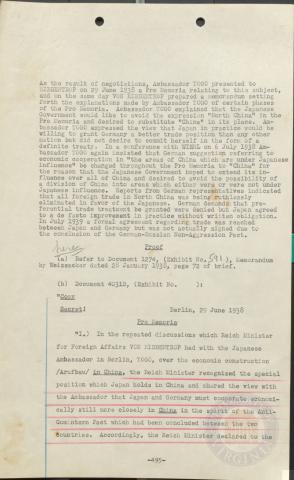
Page 495
| Parent | Collaboration between Japan, Germany and Italy Vol. VI |
|---|---|
| Date | |
| Language | English |
| Collection | Tavenner Papers & IMTFE Official Records |
| Box | Box 15 |
| Folder | Japan, Germany, Italy Collaboration Vol 6 |
| Repository | University of Virginia Law Library |
As the result of negotiations, Ambassador TOGO presented to RIBBENTROP on 29 June 1938 a Pro Memoria relating to this subject, and on the same day VON RIBBENTROP prepared a memorandum setting forth the explanations made by Ambassador TOGO of certain phases of the Pro Memoria. Ambassador TOGO explained that the Japanese Government would like to avoid the expression "North China" in the Pro Memoria and desired to substitute "China" in its place. Am¬bassador TOGO expressed the view that Japan in practice would be willing to grant Germany a better trade position than any other nation but did not desire to commit herself in the form of a definite treaty. In a conference with WIEHL on 6 July 193$ Em¬bassador TOGO again insisted that German suggestion referring to economic cooperation in "the areas of China which are under Japanese influence" be changed throughout the Pro Memoria to "China" for the reason that the Japanese Government hoped to extend its in¬fluence over all of China and desired to avoid the possibility of a division of China into areas which either were or were not under Japanese influence. Reports from German representatives indicated that all foreign trade in North China was being ruthlessly eliminated in favor of the Japanese. German demands that pre¬ferential trade treatment be granted were denied but Japan agreed to a de facto improvement in practice without written obligation. In July 1939 a formal agreement regarding trade was reached between Japan and Germany but was not actually signed due to the conclusion of the German-Russian Non-Aggression Pact.
PROOF
a) Refer to Document 1274, (Exhibit No. jT^ 1 ), Memorandum by Weizsacker dated 28 January 1938, page 72 of brief.
(b) Document 403IB, (Exhibit No. ): "Copy
SecretIBerlin, 29 June 1938
Pro Memoria
"I.) In the repeated discussions which Reich Minister for Foreign Affairs VON RIBBENTROP had with the Japanese Ambassador in Berlin, TOGO, over the economic construction /Arufbau/ in China, the Reich Minister recognized the special
position which Japan holds in China and shared the view with
the Ambassador that Japan and Germany must cooperate economi¬cally still more closely in China in the spirit of the Anti-
Comintern Pact which had been concluded between the two
Countries. Accordingly, the Reich Minister declared to the
